|
In October of 1992 I had the opportunity to attend the Festival of the Pacific in Rarotonga, Cook Islands. Seven thousand people from 27 pacific nations converged on the island to present their work and share their respective cultures with one another.
Upon my return I created a body of objects inspired by the experience. The work, created under the rubric "When Instinct Turns to Artifice," includes poems, drawings, paintings and ceramic vessels.
Among the most significant revelations for me was gaining appreciation for the iconography used in south pacific tattoos. They were much like the images that I had "doodled" throughout my life. Consequently, I am finally able to assign aesthetic value to the library of icons I have developed since first holding a pencil.
The following ceramic pieces are representative of the body of work:

|

|
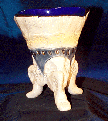
|

|

|
3" Bowl |
3" Bowl |
Chalice |
17" Platter |
17" Platter |
Today I continue to make work that is based on the reservoir of images, sounds, smells and flavors I encountered on Rarotonga. The desire to return to that island paradise is strong, yet it is imminently apparent that "place" was only a part of the experience. Perhaps the "time" can never be relived.
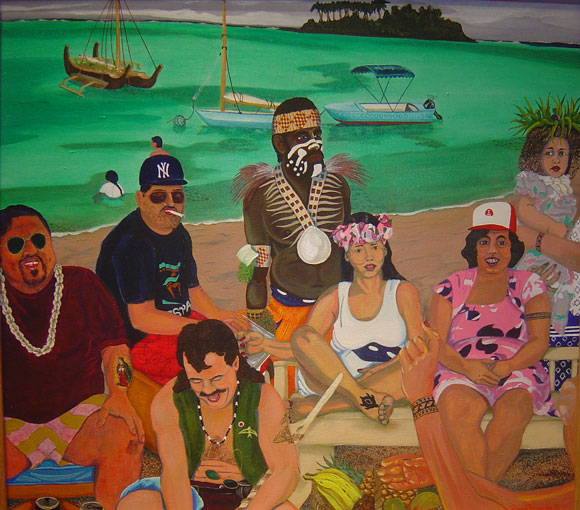
Ricardo Hernandez © 1998
The painting above was inspired by a party that was held at the home of the only Cook Islander that has ever been ordained a Catholic Priest. Having heard that Guam was bringing a Tuva Master to the Festival, the Father invited the contingent to stay at the church. At the party we joked that the Communion ceremony would never be the same. Tuva is a drink made from the young branches of the palm tree. It is said that the first day you can drink it straight, the second day you can mix it with your beer, and the third day you can mix it with oil and put it on your salad. If not consumed by the fourth day it must be discarded. Fortunately, there were many palm trees on the grounds of the church.

(From the collection of Deborah Dobbins)
The simplicity of form and the exquisite function of many of the tools I encountered was fascinating. Pictured above is a 17" platter depicting a young man grating coconuts. For me, the device was reminiscent of a shoe shine box with a serrated metal tongue. Coconuts are cut in half with a machete and a bowl is placed under the tongue. Then the shredder is straddled and a coconut half is placed over the tongue and turned rapidly, while cupped in both hands. Coconuts can be shredded clean in a matter of minutes, with little effort. The results are a bowl full of shredded coconut, a major ingredient in many Polynesian dishes, and many clean coconut halves that can be made into other useful items. Any novice that has tried to eat the meat out of a coconut, with little success, is sure to have a great appreciation for this profound device.
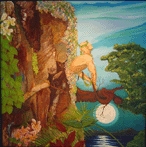
Pushing Through To The Other Side Of The World
© Ricardo Hernandez 1999
The Following Poem was Inspired by a Ride on this Marshalese Vaka (Seafaring Canoe).
That color blue was so compelling!
I stood on the deck and gazed deep
in to that cobalt hue. In an instant
I realized how little I knew and
how in the context of humanity,
I was but a drop.
Yet, as we sliced through another
furrow of sea, droplets hurled
through the air, my face cooled
by the onslaught, guarded from
the perils of the Polynesian sun.
I could not help but to think that
those drops had for centuries
lain waiting, for that moment,
to fullfill their destiny.
That color blue was so compelling!
Ricardo Hernandez � 1993 | 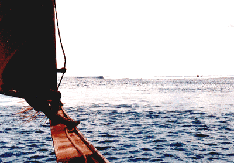 |
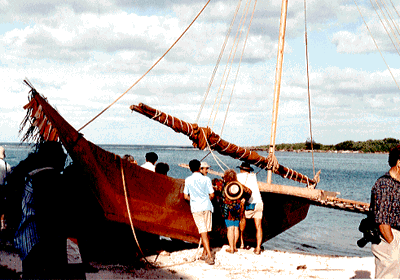
|
